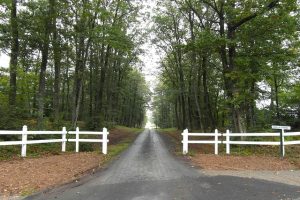Posted in Real Estate Law

An easement existed to provide access and utilities crosses an adjacent property via a driveway. Those owning the rear property improved the easement with pavement, plantings, irrigation and lighting. The owners of the front property did not object to this work and the improvements are maintained for many years. The arrangement worked well until both property owners sold their homes.
Greg Franc bought the front property, James Richardson bought the rear property. Six years after Franc bought the property, twenty years after the improvements were first put in, he demanded that Richardson remove the improvements. He cut electrical and irrigation lines along the driveway then had has attorney write a letter to the Richardsons demanding action. They responded with a lawsuit.
- Franc claimed the improvements exceed the purpose of the easement (access for utilities and for the Richardsons) and the rear property owners never had express permission of the front property owners to make the improvements.
- Richardson argued that the acquiescence to the improvements by the prior owner as well as the expense and effort in improving and maintaining the easement by both the current and previous rear property owners establish an irrevocable license to continue to maintain the easement improvements.
A California Court of Appeals decided for Richardson. It held that the effort and costs in improving and maintaining the easement by he and the prior owner, along with the front property owners’ failure to object for the first six years establish he received implied permission and has the right to an irrevocable license (a right to do something on another’s property) to maintain the improved easement across the front property.
The Court of Appeals ruled,
- The “tacit permission or acquiescence in acts already done” is sufficient to establish whether Franc gave the Richardsons permission to keep and maintain such landscaping and related improvements.
- The Richardsons “knew or should have known” the easement was for access and utility purposes only, but that was irrelevant to the issue of an implied license.
As a result property owners need to understand that allowing a party to make improvements above and beyond what’s strictly needed for an easement can result in an implied license allowing the party to continue his or her activities on your property, no matter the purposes of the easement.
If you have an easement on another property, or that easement is on your property, and you have questions about your legal rights, contact our office so we can discuss the situation, your objectives and the best ways to protect your rights.
